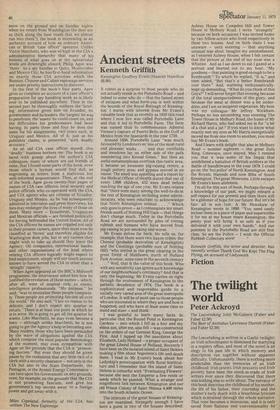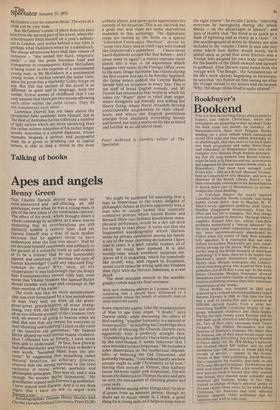The twilight world
Peter Ackroyd
The Leavetaking John McGahern (Faber and Faber £2.50) The Best of Antrobus Lawrence Durrell (Faber and Faber £2.50) The Lea vetaking is written in a Gaelic twilight; an Irish schoolmaster is dismissed for marrying in a registry office, and most of the novel is an elegy to his past life in which memory and description run together without apparent difficulty. Unfortunately, there is nothing more predictable than the memories of an Irish childhood: Irish priests, Irish peasants and Irish poverty have been the stock-in-trade of Irish writers ever since they discovered that there was nothing else to write about. The narrator of this book describes the childhood of his mother, the life of his father, their courtship and the mother's early death with a breathless lyricism which is strained through the whole narrative. That tone becomes a monotone, and it is only saved from flatness and conventionality by McGahern's eye for natural detail. The eyes of a child can be very wide. . But McGahern's sense of place does not save him from the second part of his novel, when the schoolmaster finds himself on a year's sabbatical in London, and works behind a bar (this is perhaps what Dubliners mean by a sabbatical). His sexual adventures have that thin veneer of romance — "she smiled her hard, enigmatic smile" — but the prose becomes hard and transparent in consequence. Either McGahern is being ironic at the expense of a sentimental young man, or Mr McGahern is a sentimental Young writer. I incline toward the latter view, since his prose has a markedly Celtic fringe on top. But this last section of the novel is so different, in spirit and in language, from the earlier, lyrical scenes of childhood that I can only assume that there are two novels elbowing each other within the same covers. They do not complement each other. Lawrence Durrell has not been above the occasional false aesthetic note himself, but in The Best of Ant robus he has collected a number of light satires which are more satisfying than the rather solemn whimsies of his rather longer novels. Antrobus is a retired diplomat, whose memoirs bespeak a serious and purposeful man; he is given to breaking out in capital letters, is able to find a moral in the most
Talking of books



























 Previous page
Previous page